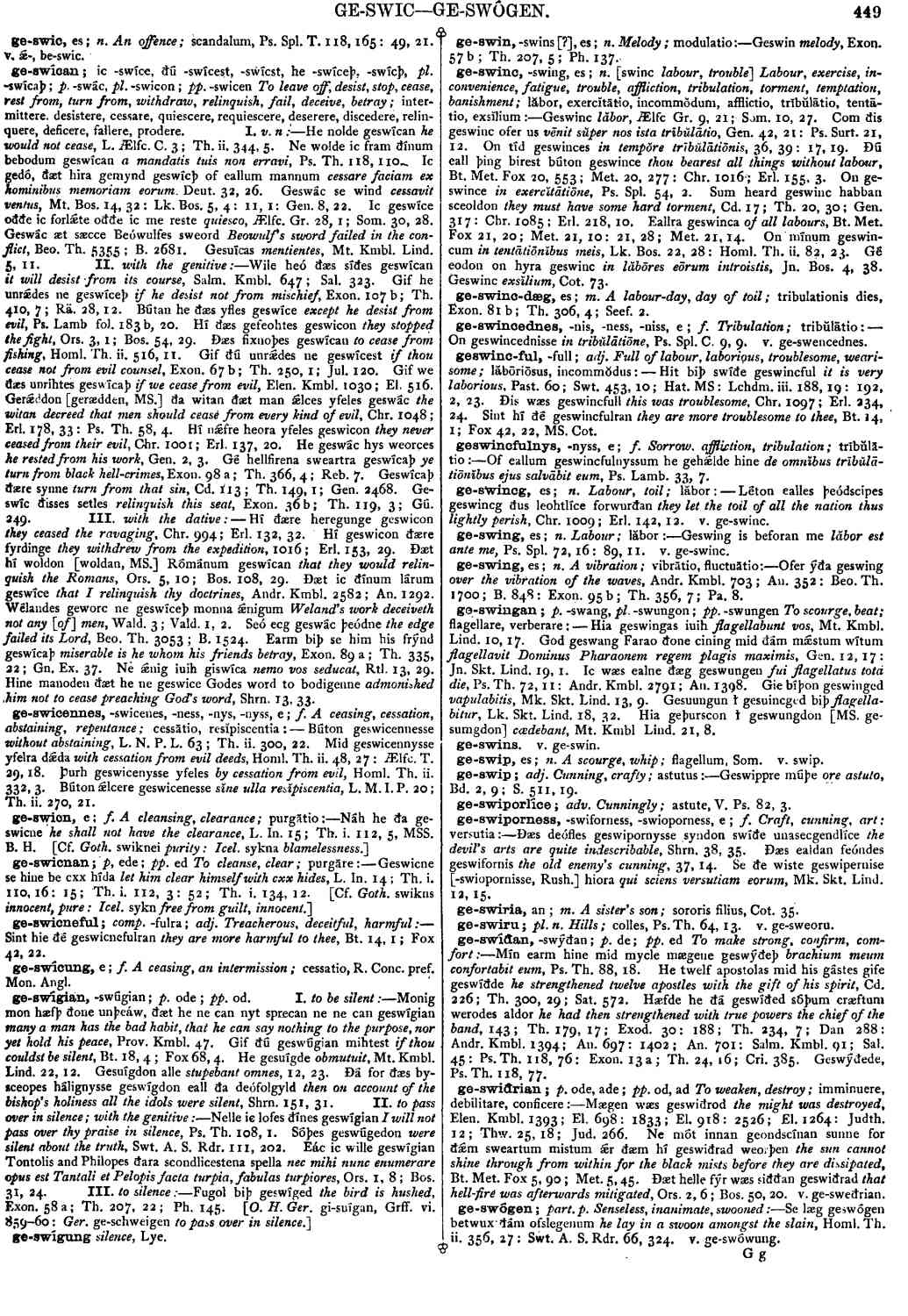ge-swícan
- verb [ strong ]
-
He nolde geswícan
he would not cease,
- L. Ælfc. C. 3; Th. ii. 344, 5.
-
Ne wolde ic fram ðínum bebodum geswícan
a mandatis tuis non erravi,
- Ps. Th. 118, 110.
-
Ic gedó, ðæt hira gemynd geswícþ of eallum mannum
cessare faciam ex hominibus memoriam eorum.
- Deut. 32, 26.
-
Geswác se wind
cessavit ventus,
- Mt. Bos. 14, 32: Lk. Bos. 5, 4: 11, 1: Gen. 8, 22.
-
Ic geswíce oððe ic forlǽte oððe ic me reste
quiesco,
- Ælfc. Gr. 28, 1; Som. 30, 28.
-
Geswác æt sæcce Beówulfes sweord
Beowulf's sword failed in the conflict,
- Beo. Th. 5355; B. 2681.
-
Gesuícas
mentientes,
- Mt. Kmbl. Lind. 5, 11.
-
Wile heó ðæs síðes geswícan
it will desist from its course,
- Salm. Kmbl. 647; Sal. 323.
-
Gif he unrǽdes ne geswíceþ
if he desist not from mischief,
- Exon. 107 b; Th. 410, 7; Rä. 28, 12.
-
Bútan he ðæs yfles geswíce
except he desist from evil,
- Ps. Lamb fol. 183 b, 20.
-
Hí ðæs gefeohtes geswicon
they stopped the fight,
- Ors. 3, 1; Bos. 54, 29.
-
Ðæs fixnoþes geswícan
to cease from fishing,
- Homl. Th. ii. 516, 11.
-
Gif ðú unrǽdes ne geswícest
if thou cease not from evil counsel,
- Exon. 67 b; Th. 250, 1; Jul. 120.
-
Gif we ðæs unrihtes geswícaþ
if we cease from evil,
- Elen. Kmbl. 1030; El. 516.
-
Gerǽddon [gerædden, MS.] ða witan ðæt man ǽlces yfeles geswác
the witan decreed that men should cease from every kind of evil,
- Chr. 1048; Erl. 178, 33: Ps. Th. 58, 4.
-
Hí nǽfre heora yfeles geswicon
they never ceased from their evil,
- Chr. 1001; Erl. 137, 20.
-
He geswác hys weorces
he rested from his work,
- Gen. 2, 3.
-
Gé hellfirena sweartra geswícaþ
ye turn from black hell-crimes.
- Exon. 98 a; Th. 366, 4; Reb. 7.
-
Geswícaþ ðære synne
turn from that sin,
- Cd. 113; Th. 149, 1; Gen. 2468.
-
Geswíc ðisses setles
relinquish this seat,
- Exon. 36 b; Th. 119, 3; Gú. 249.
-
Hí ðære heregunge geswicon
they ceased the ravaging,
- Chr. 994; Erl. 132, 32.
-
Hí geswicon ðære fyrdinge
they withdrew from the expedition,
- 1016; Erl. 153, 29.
-
Ðæt hí woldon [woldan, MS.] Rómánum geswícan
that they would relinquish the Romans,
- Ors. 5, 10; Bos. 108, 29.
-
Ðæt ic ðínum lárum geswíce
that I relinquish thy doctrines,
- Andr. Kmbl. 2582; An. 1292.
-
Wélandes geworc ne geswíceþ monna ǽnigum
Weland's work deceiveth not any [of] men,
- Wald. 3; Vald. 1, 2.
-
Seó ecg geswác þeódne
the edge failed its Lord,
- Beo. Th. 3053; B. 1524.
-
Earm biþ se him his frýnd geswícaþ
miserable is he whom his friends betray,
- Exon. 89 a; Th. 335, 22; Gn. Ex. 37.
-
Ne ǽnig iuih giswíca
nemo vos seducat,
- Rtl. 13, 29.
-
Hine manoden ðæt he ne geswice Godes word to bodigenne
admonished him not to cease preaching God's word,
- Shrn. 13, 33.
Bosworth, Joseph. “ge-swícan.” In An Anglo-Saxon Dictionary Online, edited by Thomas Northcote Toller, Christ Sean, and Ondřej Tichy. Prague: Faculty of Arts, Charles University, 2014. https://bosworthtoller.com/16275.
Checked: 0